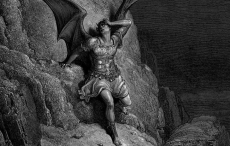
Email: reecejordan98@hotmail.co.uk
Total Article : 168
About Me:18-year-old sixth form student, studying English Literature, History and Government and Politics. My articles will broadly cover topics from the current affairs of politics to reviews of books and albums, as well as adding my own creative pieces, whether it be short fiction or general opinion.

John Milton’s Paradise Lost gets a bad stick. At least by the majority of English Literature students at the University of Bristol. I love it, but for many it is too dense and a rehash of classical epics and biblical texts (arguments, incidentally, that I find too lazily put together and unfounded to be of much value). But perhaps the biggest problem people have with the poem is that of Milton’s Satan. Why is it that throughout the entirety of the poem we side more with that whom we must be afraid of than with a benevolent God?
This very inclination towards the devil has led many to believe that Milton had sympathies against God. Romantic poet William Blake has stated that Miton was ‘on the devil’s side without realising it’. And it’s hard to argue against him. Instead of ‘justifying the ways of God to man’, Milton’s epic does the inverse. God is obscured as cold and inhumane whilst Satan holds up as a typical epic hero. He fights against tyranny, is a rousing orator, does the seemingly impossible, and does it all with almost no complaint. God, on the other hand, is characterised as a tyrant, almost holding those in heaven hostage, never fighting himself but sending his associates. No wonder Satan, in disguise as the serpent, succeeds so easily in tempting Eve to eat the fruit; the alternative is so weak.
But where Blake’s argument falls short is the assertion that Milton did this unwillingly, that he was on Satan’s side ‘without knowing it’. This argument is brilliantly contested in Stanley Fish’s book, Surprpised by Sin, in which he argues that Milton’s composition of both God and Satan as aloof and alluring respectively is intentional. The reason for this, Fish asserts, is because Paradise Lost is to be read as an experiential process, one whereby we distance ourselves from God and side with Satan, just as Adam and Eve do. Like them, we fall, and we are supposed to finish the poem realising our susceptibility of the temptation antithetical to God. In this we are Milton’s ‘fit audience’.
This argument is amplified upon closer analysis of the way in which Milton has God and Satan speak. There are different types of speech, which include, but are not limited to, logic and rhetoric. The former is speech that deals with clarity and explanation, the latter deals with persuasion where meaning can be obscured. Throughout Paradise Lost God speaks almost wholly logically whereas Satan’s speech is riddled with rhetoric. Thus, it is no surprise we side with Satan; his speech is constructed to persuade. The poem, then, shows not just our ability to go against God, but also our susceptibility to persuasion.
Image Credits: americamagazine.org

0 Comment:
Be the first one to comment on this article.